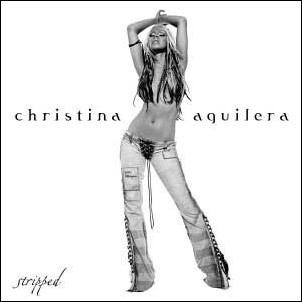Aguilera’s latest album ‘Stripped’ a surprise

Image: Aguilera’s latest album ‘Stripped’ a surprise:Photo courtesy of www.amazon.com:
November 20, 2002
Hornet Rating:
I’d like to say Christina Aguilera has come a long way. But it seems like if she has, she’s surpassed the natural speed of a freefall and reached the seventh circle of hell (care to see the “Lady Marmalade” video again?). Surprisingly, Stripped is everything her new album was rumored for: reinvention.
Everybody with a long-lasting career in music has had to reinvent themselves to some degree in order to survive. Madonna does it the best, and siblings Michael and Janet Jackson have crashed and burned for their own appropriately bizarre reasons: Mike’s Invincible was an undeserved failure and Janet just lost the greatness that made 1989’s Rhythm Nation 1814 a smash.
Rhythm Nation was Janet’s turning point, where the fun and art in music joined together beautifully. Suddenly, she was on the map as an artist, not just a performer. Stripped, in this day and age of marketability over artistic merits, has the potential to do the same for Aguilera.
Both albums are filled with interludes (though thankfully, Stripped has a small handful versus Rhythm Nation’s equal number of interludes and songs), expressing thoughts, feelings and passions of their respective artists. Aguilera is quite clear and blunt to the attacks and pains endured in her career. And while this is not the kind of CD grade school children should be exposed to, she is expressing a stance of independence and individuality. The same independence used by diva Mariah Carey to horrifying effect in her Rainbow album.
But where Carey failed, Aguilera succeeds. Carey’s lyrics were nothing special, and her remake of Phil Collins’ “Against All Odds,” while respectable, couldn’t save her.
Aguilera benefits from having written all but two out of 16 songs on the album, with no obvious samplings and no remakes. She also experiments with a wide range of styles and genres for this career transformation. Lil’ Kim joins her for an obligatory R&B “Can’t Hold Us Down;” nothing terribly new here. But they’re followed by a somber jazz feel in “Walk Away,” containing a piano backing which feeds nicely into “Fighter” and its rock support. “Infatuation” involves a Latin feel crossed with more R&B, and then “Beautiful” is a nice confidence-building ballad where Aguilera smartly resorts to a more conservative sensibility. That mentality of genuine music, as well as more touches of jazz, permeates the rest of the album, with one exception, “Dirrty.”
“Dirrty” is just the kind of rough groove Aguilera needed to usher in this album, but it sticks out of the overall feel. Fortunately, not too much, because just like the other tracks, it shares another requirement for her to have a lasting career: no wretched stench of our generation’s bubble-gum. Redman doesn’t exactly impress as her bridge rapper, so one can’t help but wonder if having O.D.B. in his place would have made some sort of difference. In the end, it’s actually a good track.
Speaking of ends, the last three tracks (“The Voice Within,” “I’m OK,” and “Keep On Singin’ My Song”) almost become dangerously self-centered and self-serving, but good lyrics working with equally good music keep her out of a fizz.
Compared to the conservative first pressing of her self-titled debut (which did not include the saucier and sexier versions of “What a Girl Wants” and “Come on Over”), this is a brilliant second album (if not to count her Christmas and Spanish language albums). Success in music is usually marked by sticking both with what’s good and what works, or reinvention and growth. She somehow mixed both like the best of them. Too bad she doesn’t live in the same world as Rhythm Nation did. Nevertheless, this sounds like the beginning of something “Beautiful.”






















































































































